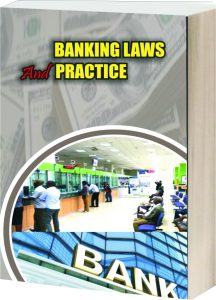 The book Banking Laws and Practice is an improvement on the book Law of Banking by T.A.O Tugbiyele. More Topics are covered such as Notice of Dishonour of and Protest on Bills of Exchange, Court Action by Banks and against Banks, Jurisdiction of State and Federal High Court in Banker and Customer relationship and Banking matters, Securities for advances perfection and documentation of securities for advances, laws relating to Banking and Financial Institutions.
The book Banking Laws and Practice is an improvement on the book Law of Banking by T.A.O Tugbiyele. More Topics are covered such as Notice of Dishonour of and Protest on Bills of Exchange, Court Action by Banks and against Banks, Jurisdiction of State and Federal High Court in Banker and Customer relationship and Banking matters, Securities for advances perfection and documentation of securities for advances, laws relating to Banking and Financial Institutions.
This book is written borne out of over thirty years experience by the author who has handled bank cases and had conducted seminars and participated in workshops for banks. Hard Cover.
For soft copy on your laptop and desktop you can visit www.thelawmaster.com to download the application.
For soft copy on your android device on the play store type in lawmaster mobile to download the application.
TABLEOF CONTENTS
CHAPTER 1
BANKING INSTITUTION AND THE NIGERIAN BANKING SYSTEM
CHAPTER 2
BANKER/ CUSTOMER RELATIONSHIP
2.01. Banker/ customer relationship: the bedrock of banking
2.02. Definition of a Bank
2.03. Definition of bank customer
2.04. Nature of Banker / Customer Relationship
2.05. The legal Rights and Duties under the Banker/Customer Relationship
2.06. Action in defamation for the wrongful dishonor of a customer’s cheque
CHAPTER 3
BANKERS DUTY TO THE CUSTOMER
3.01. Duties of the banker to keep the customer’s account separate
3.02. Duty of banker in relation to the customer’s statement of account
3.03. Banker’s duty with respect to countermanded cheques
3.04. Bankers duty of secrecy
3.05. Duty of bank to charge a reasonable interest on loan and overdraft facility
3.06. Duty of care on bank when opening new account for the customer
3.07. Duty of a bank in opening an account for a limited liability company
3.08. Duty on issuing reports on customers account
3.09. Duty of reasonable care and skill
3.10. Duty of banker to the customer in respect of foreign currency transactions
3.11. Duty of banker to notify the customer of his intention to close the customer’s account
3.12. Duty of the banker in the discounting of bills
3.13. Duty of the banker in the collection of bills
3.14. Duties of the Bank to Honour the Customer’s Cheques
3.15. Measure of Damages In An Action Against A Banker For Breach Of Contract To Honour A Cheque
3.16. Damages for wrongful dishonor of a Customer’s cheque- whether customer is a person in business or a non-trader
3.17. Duty of Banks in relation to Crossed Cheques
3.18. Duty of banker in relation to Uncrossed Cheques
3.19. Duty of bank debiting customer’s account without his instructions
3.20. Duty of banks to protect customer’s fund
3.21. Duty of bank to refund money on failure to transfer as instructed
3.22. Duty on Bank to carry out the customer’s mandate
3.23. Customer’s duties to the bank
3.24. Banker and Non – Customer Relationship – Legal Relationship
CHAPTER 4
BANKER AND CUSTOMER RELATIONSHIP – OVERDRAFT, APPROPRIATION OF PAYMENTS, GARNISHEE ORDERS
4.01. Overdraft
4.02. Agreement to overdraw account
4.03. Interest on overdraft Account
4.04. Repayment of Overdraft by a bank Customer
4.05. Appropriation of Payments Made To Banker
4.06 Garnishee Orders
4.07. Enforcement of money judgment by garnishee proceedings.
4.08. Distinction between enforcement of judgment by writ of execution and by garnishee proceedings
4.09. Necessary parties to garnishee proceedings.
4.10. Nature of order of a trial court refusing to discharge its garnishee order nisi
CHAPTER 5
TYPES OF ACCOUNTS
5.01. Types of accounts
5.02. Temporal Accounts
5.03. Tangible Accounts
5.04. Statement of account
CHAPTER 6
NOTICE OF DISHONOUR OF AND PROTEST ON BILLS OF EXCHANGE.
6.01. Bill of Exchange- Definition
6.02. Dishonour of a Bill of Exchange
6.03. Dishonor by non-acceptance
6.04. Dishonor by non-payment
6.05. Rules as to notice of dishonor.
6.06. Noting of protest of Bills.
6.07. Criminal Responsibility for Dishonored Bills
CHAPTER 7
BANKERS FINANCIAL OPERATIONS
7.01. Bank Notes
7.02. Lost and Damaged Notes
7.03. Crimes in relation to bank notes in Nigeria
7.04. Definition of Cheque
7.05. Differences between cheques and other bills
7.06. Endorsement of cheques-Requirement for a valid endorsement.
7.07. Undated Bill
7.08. Overdue, stale or statute barred cheque
7.09. Antedating and Post dating cheques.
7.10. Crossed cheques
7.11. General Crossing
7.12. Special Crossing
7.13. Effect of crossing
7.14. “Not negotiable”
7.15. “Account Payee”
7.16. Who may cross a cheque?
7.17. Purpose of Crossing
7.18. Opening a crossing
7.19. The Duties of Paying and Collecting Banker: Protection under the law Duties of a Paying Banker
7.20. Protection of a Paying Banker.
7.21. Protection of Collecting Banker
CHAPTER 8
CONVERSIONS AND FORGERIES
8.01. Conversion
8.02. Distinction between a banker acting as banker and a banker acting as bailee
8.03. Bankers Statutory Protection against Conversion
8.04. Forgery
8.05. Forgery of Bills of Exchange- Legal Effect
8.06. Banks liability to pay in Respect of Forged Cheques – Exception
CHAPTER 9
NEGOTIABLE INSTRUMENTS
9.01. Definition of Negotiable Instruments
9.02. Kinds of Negotiable Instruments
9.03. Bill of Exchange- Definition
9.04. Negotiable Bill of Exchange
9.05. Negotiation of Bills of Exchange
9.06. Rules as to Presentment of a Bill for Payment.
9.07. Cheques.
9.08. Promissory Notes.
9.09. Share or Dividend Warrants
9.10. Bankers drafts
9.11. Debenture.
CHAPTER 10
COURT ACTION BY BANKS AND AGAINST BANKS
10.01. Court action by banks against their Customers.
- 02 Debt Recovery Exercise. 152
10.03. Bar to court action for the recovery of debts.
10.04. Debtors dispute on interest rate applicable
10.05. Action by bank customer against banks
10.06. Jurisdiction of court in action by Banks or against Banks
CHAPTER 11
SECURITY FOR ADVANCIES
11.01. Introduction.
11.02. Guarantee
11.03. Life Insurance Policies
11.04. Stocks and Shares
11.05. Promissory Notes
11.06. Debentures
11.07. Floating Charges
11.08. Consequences of Default where a Debenture is used as the Security for Loan
11.09. Commercial Credits Associated With International Trade
11.10. Cash in Deposit Accounts, Fixed Deposits, Cash Accounts
11.11. Pledge of Personal Chattel
11.12 Domiciliation of Payment
11.13 Trust Receipts
11.14 Bill of Sale
11.15 Hypothecation of Goods
11.16. Negative Pledge
11.17 Fixed Deposits / Savings Account
11.18 Mortgages
11.19. Distinction Between Equitable Mortgage And Legal Mortgage
11.20 Discharge of Mortgage
11.21 Requirement of Governor’s consent for a mortgage to be valid.
11.22 Obtaining Governor’s consent.
11.23 Mortgagee’s Exercise of Power of Sale
11.24 Duty on Mortgagee exercising his power of sale
11.25 Sale of mortgaged property by auction.
11.26 Sale of mortgage property at under value.
11.27 Deprivation of mortgagor’s power to deal with mortgaged property.
11.28. Mortgagors application for Injunction restraining the Mortgagee from Exercising His Power of Sale.
11.29. Equity of Redemption
CHAPTER 12
PERFECTION AND DOCUMENTATION OFSECURITIES FOR ADVANCES
12.01 Introduction.
12.02 Perfection of Security
12.03 Title to land in Nigeria.
12.04 Enactments for the registration of instruments for security for advances
12.05 Inspection Survey and Valuation Reports
12.06. The Land Registry.
12.07. Functions of the land Registry
12.08 Registration of mortgages
